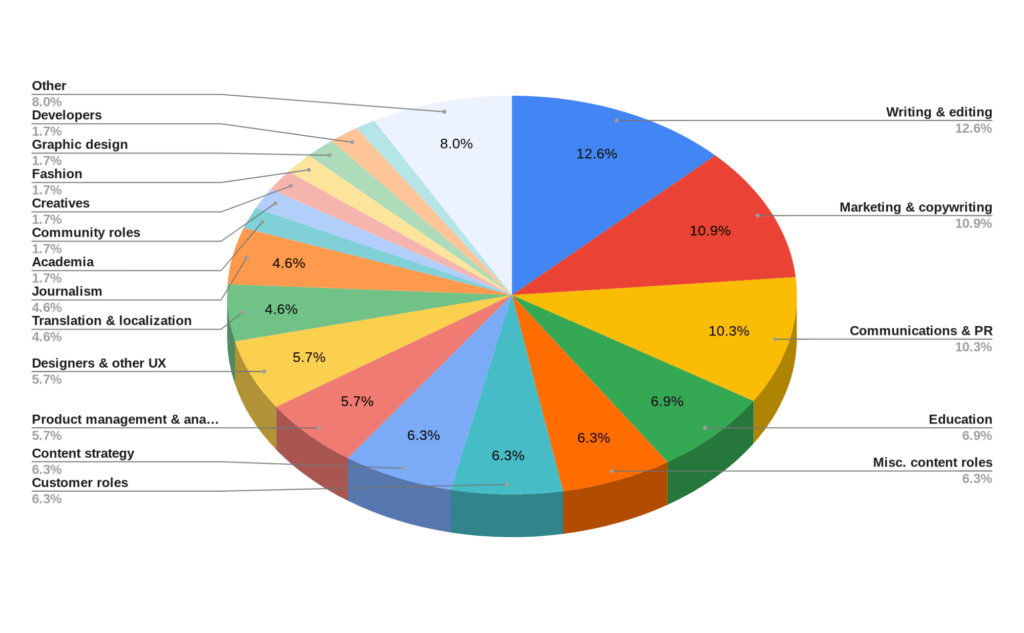Table of Contents
Ask ten UX writers/content designers what they did previously in their careers, and you may get ten different answers. Copywriter, journalist, technical writer—sure, those are the obvious ones.
But we at the UX Writing Hub have always known that many other professional backgrounds are represented in the field.
So in our most recent salary survey, we asked UX writers and content designers specifically what they did before getting into the field.
In this quick article, we’ll share the data, do some analysis, and look at the advantages of various professional backgrounds for career transitioners.
The professional backgrounds of UX writers/content designers
I won’t keep you in suspense—here are the numbers:

UX writer/content designer professional backgrounds | Percentage |
Writing & editing | 13% |
Marketing & copywriting | 11% |
Communications & PR | 10% |
Education | 7% |
Misc. content roles | 6% |
Customer roles | 6% |
Content strategy | 6% |
Product management & analysis | 6% |
Designers & other UX | 6% |
Translation & localization | 5% |
Journalism | 5% |
Academia | 2% |
Community roles | 2% |
Creatives | 2% |
Fashion | 2% |
Graphic design | 2% |
Developers | 2% |
Law | 1% |
Other | 8% |
These stats are a mix of what we’d expect to see, along with some surprises.
For instance, writing, editing, marketing, and copywriting are the most popular backgrounds and, together with content strategy, make up 30% of responses. It’s not surprising that those are the top backgrounds, but the fact that 70% have a different background is unexpected.
Another surprise: 10% of UX writers/content designers worked in communications & PR.
And if we look closer, we see that many UX writers/content designers don’t have a writing-focused professional background at all.
Do you need a writing background in UX writing?
Let’s dive deeper into those stats.
I’d count the following as writing-focused backgrounds:
- Writing & editing
- Marketing & copywriting
- Communications & PR
- Misc. content roles
- Content strategy
- Translation & localization
- Journalism
These make up about 55% of respondents. Then, we should include education too, since many respondents were specifically English or language teachers. That gets us to about 63%.
I’m tempted to put academics in there as well. I mean, they write a lot—if you could call it writing. OK—cheap shot. Academic writing might not be clear or concise, but we’ll put them in the “writers” category, which gets us to 64%.
So who are the rest?
There are a lot of product people. These are the PMs, UX/product designers, UX researchers, and other UXers. Together, they make up 11% of respondents. So writers plus product/UXers gets us to 75%.
As for the remaining 25%, it’s a wonderfully eclectic mix of backgrounds.
Non-writing backgrounds of UX writers and content designers
To answer a question that we get asked a lot: no. You don’t need a writing or UX background to work as a UX writer. It obviously helps, but backgrounds in customer service, community, graphic design, fashion, and law all made a showing in the survey results.
Here are some other responses:
- Art direction
- Banking
- Cultural projects manager and actress
- HR
- IT support
- Nonprofit volunteer manager
- Operations and finance director on a mayoral campaign
- Photographer
- Social work manager
- Theatrical adviser
- Line cook
Also, while running the UX Writing Academy, we’ve worked with students who successfully made the transition from roles including:
- Kindergarten teacher
- College admissions consultant
- Retail specialist
- Architect
- Esports commentator
- Van life conversion design
- Scuba diving instructor
- Banjo-playing hobo (JK—just keeping you on your toes)
And, most uncoincidentally, we’re currently running a poll on LinkedIn to get more data. So far, some of the non-writer/non-UX results are:
- Biology
- Speech-language pathologist
- Librarian
- Industrial design
- Quality analyst
The LinkedIn poll was phrased differently and gave people four choices: copywriter, technical writer, UX designer, and other (please comment). That might account for some discrepancies between the salary survey and LinkedIn poll results. A lot of LinkedIn respondents likely picked an option rather than going into detail. Here’s where it currently stands:

At the end of the day, the exact figures aren’t important. Yes, most people in the field have strong writing backgrounds or UX experience. But even if you don’t, you can still make a career switch to UX writing/content design like countless others have.
What’s the best background for UX writers and content designers?
Trick question—there is no single best background. But let’s examine a few to see what each brings to that proverbial product team table.
Writing & editing
Survey results included: technical writer, proofreader, knowledge base writer, proposal writer, scriptwriter, and more.
Clearly, the wordsmiths have an advantage when it comes to general writing skills and making sure product copy is grammatically correct. They also benefit from editorial skills (make it shorter!) and typographical knowledge.
Marketing & copywriting
Survey results included: copywriter, marketing specialist or manager, social media coordinator, campaign manager, and more.
Marketers and copywriters know the importance of understanding and appealing to a target audience. They also have experience creating fun, witty, attention-grabbing copy. That’s not job #1 in UX, but it’s occasionally beneficial.
Education
Survey results included: creator of educational test preparation material, English professor, teacher assistant, eLearning specialist, and more.
We hear from many teachers who are interested in UX writing, and they often fail to see just how relevant their experience is. Educators have a knack for avoiding the curse of knowledge, i.e. they recognize that others don’t necessarily know what they know. This is crucial when guiding users through a complex interface.
Combine that with patience and empathy, and it’s no wonder teachers make for great UXers.
Journalism
Survey results included: journalist, chief editor, news publisher, and more.
Gratuitous factoid: “journalism” comes from the french word “journal,” which means “newspaper.” Journalists know how to cut the fluff and keep it short and simple—just like in UX.
Content roles
Survey results included: content analyst, content developer, content manager, content producer, content lead, content strategist, and more.
Ever get the feeling that you can just slap any ol’ word on after “content” and make a new tech role? Content synergist, content impresario, content transmogrifier. Where does it end?
Content roles are generally under marketing, so the same advantages typically apply (see above).

Academia
Survey results included: academic, academic researcher, grad student, and more.
There are plenty of former academics in UX—and for good reason. Conducting, analyzing, and drawing actionable insights from research are something every UXer should be able to do. Just be sure to avoid copy like: “It is the opinion of the author of this interface that you should click here.”
We are writers (and so can you!)
To sum up, most UX writers and content amalgamators designers have either a writing or UX/product background—but not all!
And I for one think that’s great. People from diverse backgrounds can bring a fresh perspective to the role. The world needs writers—both experienced ones and those eager to join the party.
So no matter what your current role is, there’s a good chance you’re doing something that counts as relevant experience. Think about the advantages you bring to the table.
If you’re interested in exploring the field, check out our free UX writing course.
UX writing/content design career transitions
Here are a few stories of others who made the switch:
- How teaching scuba diving showed me the importance of user experience
- How an HR background can benefit UX Writing
- How a journalism background can benefit UX writing
- How working in radio prepared me for a UX writing career
- Connecting My Dots From Journalism to UX Writing
More salary survey results:



